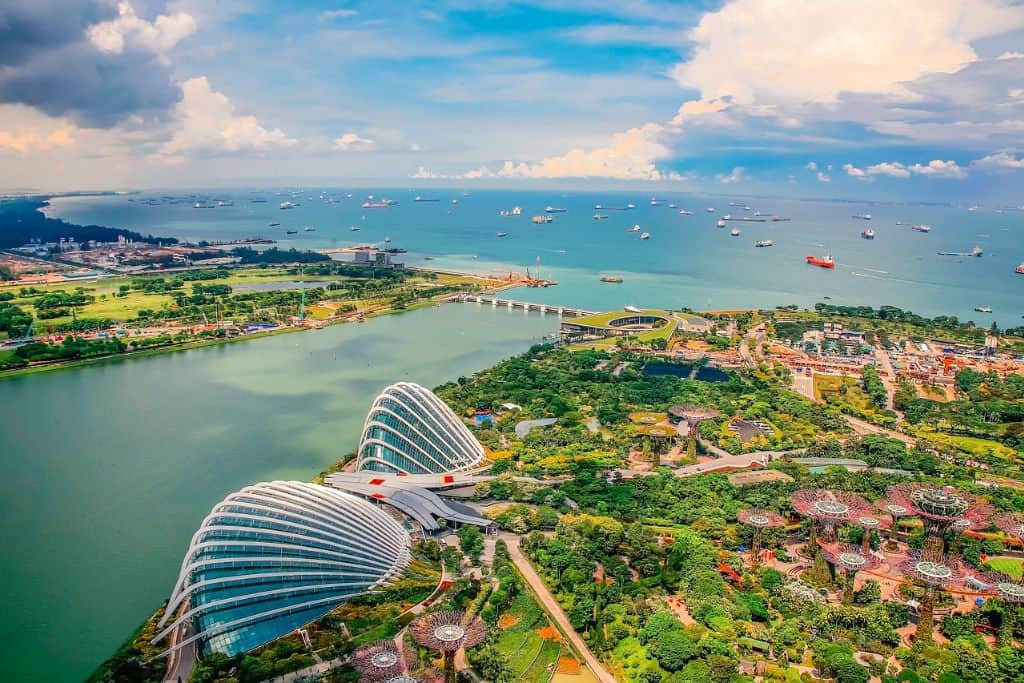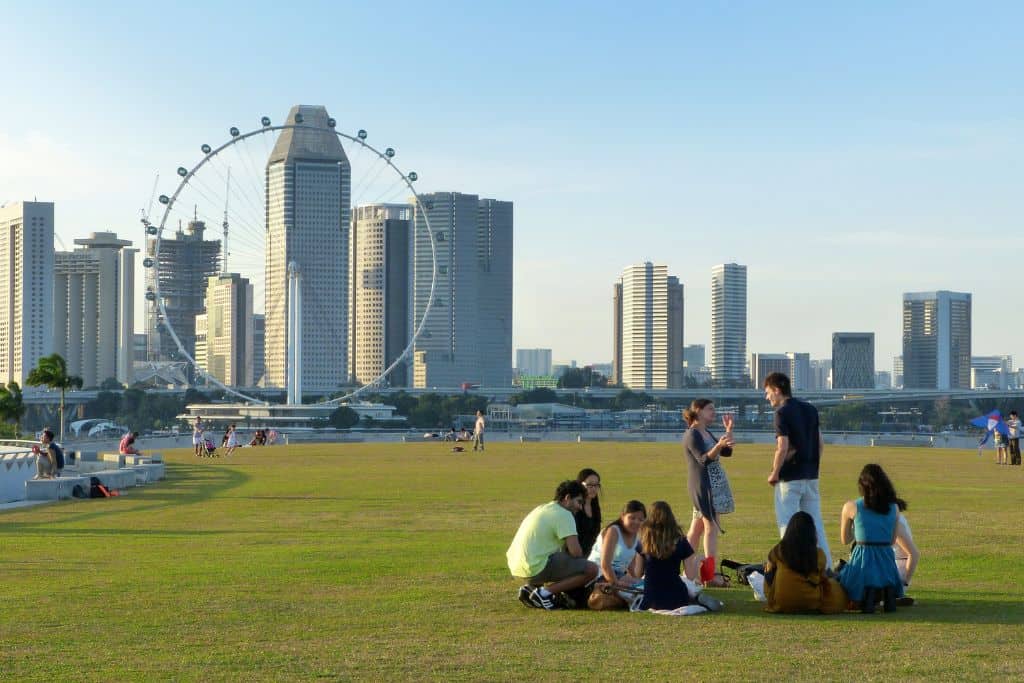
- Country Profile
- Student Life
- Education
- Requirements
- Costs
- FAQs
- prev
- next
Intro
Study in Singapore

Singapore is a small but highly developed island nation located at the southern tip of the Malay Peninsula in Southeast Asia. Known for its modern infrastructure, cultural diversity, and world-class education system, it has become a popular destination for international students seeking high-quality academic opportunities in a vibrant and cosmopolitan environment.
Singapore spans an area of approximately 719 square kilometers and enjoys a tropical climate with warm temperatures ranging between 25°C and 31°C throughout the year. Rainfall is frequent, especially during the monsoon season from November to January. Despite its compact size, the country boasts numerous green spaces, including parks, nature reserves, and urban gardens, earning it the nickname "Garden City." This makes it an ideal place for students who enjoy outdoor activities or simply appreciate a clean and green environment.
Singapore is a melting pot of cultures, with four official languages: English, Malay, Mandarin, and Tamil. The population consists of various ethnic groups, including Chinese, Malays, Indians, and others, creating a rich tapestry of traditions, cuisines, and festivals. Common celebrations include Chinese New Year, Hari Raya Puasa (Eid al-Fitr), and Christmas. For international students who study in Singapore, this diversity offers a unique opportunity to experience different cultures and broaden their horizons. English is widely used in education and daily life, making it easy for students to communicate and adapt.
Singapore's infrastructure is modern and efficient, featuring a reliable public transportation network, clean streets, and advanced technological amenities. The country is known for its safety, with low crime rates and strict laws ensuring a secure environment for residents and visitors alike. This allows international students to focus on their studies without worrying about personal security. Moreover, the government's commitment to sustainability and smart city initiatives enhances the overall quality of life.
Why Study in Singapore?
- A Global Hub for Education and Innovation: Singapore is recognized worldwide as a center for innovation and cutting-edge research. Its universities maintain strong ties with leading institutions across the globe, providing students with access to international collaborations, exchange programs, and global networks. Whether you're pursuing engineering, business, or technology, Singapore's emphasis on applied learning ensures you gain practical skills relevant to today’s industries.
- Pathway to Career Success: The country’s robust economy and status as a financial hub create numerous internship and job opportunities for students. Many multinational corporations have their regional headquarters in Singapore, giving students a chance to work alongside industry leaders. Additionally, graduates often find it easier to secure employment due to the recognition of Singaporean degrees globally.
- Multicultural Learning Environment: Choosing to study in Singapore means immersing yourself in a diverse and inclusive environment. The city-state brings together students from different cultural backgrounds, fostering cross-cultural communication skills that are highly valued in today’s global workforce. This exposure not only enhances academic growth but also prepares students socially for an interconnected world.
- Seamless Integration Through English: As English is the primary medium of instruction and is widely spoken throughout the country, adapting to life in Singapore is effortless for international students. This linguistic advantage helps students focus more on academics rather than language barriers, ensuring smoother integration into both campus and community life.
- Focus on Sustainability and Smart City Initiatives: Singapore is a pioneer in sustainable development and smart city solutions. Studying here gives you exposure to innovative approaches to environmental challenges, urban planning, and technology integration. If you're passionate about sustainability, Singapore provides ample opportunities to contribute to meaningful projects and initiatives.
- Healthcare and Quality of Life: Singapore has a well-regarded healthcare system that provides students with access to reliable medical care when needed. The city-state is known for its clean environment, green spaces, and efficient public services, contributing to a high quality of life that supports overall well-being during your time as a student.
Video
Location
-
Singapore
Facts about Singapore
Location:
- Situated in Southeast Asia, Singapore is a city-state located at the southern tip of the Malay Peninsula, bordering Malaysia to the north and surrounded by the Singapore Strait to the south.
Time Zone:
- SGT (Singapore Time) – UTC+8. Singapore does not observe daylight saving time.
Population:
- Singapore has an estimated population of approximately 5.9 million people.
Language:
- The official languages of Singapore are English, Malay, Mandarin, and Tamil.
Capital:
- Singapore
Currency:
- Singapore's official currency is the Singapore Dollar (SGD).
Student Life in Singapore
Student life in Singapore is an exciting mix of academic excellence, cultural diversity, and vibrant social experiences. With world-class universities, cutting-edge research opportunities, and a dynamic student community, Singapore offers an environment that encourages both personal and academic growth. Beyond the classroom, students can immerse themselves in a rich cultural scene, explore beautiful green spaces, and enjoy a wide variety of activities that make living and studying in Singapore truly unique. Whether you're seeking a rigorous academic challenge or a balanced lifestyle, Singapore has something to offer every student.
Getting Around Singapore
Navigating Singapore is effortless for international students, thanks to its efficient and well-connected transportation system. Whether you're heading to university or exploring the city, public transport offers fast, affordable, and eco-friendly options. Here’s an overview of the best ways to get around:
Mass Rapid Transit (MRT)
The MRT is the backbone of Singapore's transport network, providing quick access to all major areas. It's clean, punctual, and budget-friendly, making it the go-to choice for students.
Buses
With an extensive bus network, you can reach even the most remote parts of the island. Buses are frequent, reliable, and cost-effective, offering flexibility for daily commutes.
Taxis and Ride-Sharing
For convenience, taxis and ride-sharing services like Grab are readily available. They're especially useful during peak hours or when traveling with heavy luggage.
Cycling
Singapore promotes cycling as an eco-friendly alternative, with dedicated bike lanes and bike-sharing programs across the city. It's a great way to explore at your own pace while staying active.
Walking
Many areas in Singapore, such as the Central Business District and popular neighborhoods like Orchard Road, are pedestrian-friendly. Walking is not only healthy but also allows you to discover hidden gems along the way.
With these diverse and efficient transportation options, getting around Singapore is both convenient and stress-free. You'll save time, money, and energy while enjoying a seamless travel experience.
Things to Do in Singapore: Exciting Activities for International Students
Singapore offers a wide range of activities that are perfect for international students, making it an exciting place to study and explore. Whether you’re looking to relax, shop, or experience the culture, there’s something for everyone to enjoy. Here are some popular activities in Singapore that international students should not miss:
- Explore Gardens by the Bay: Visit this amazing place with futuristic gardens and the famous Supertree Grove. Don’t miss the Flower Dome and Cloud Forest, where you can see unique plants and relax in nature.
- Visit Sentosa Island: Enjoy a fun day at Sentosa with activities like Universal Studios, water parks, and beautiful beaches. It’s a great place for adventure and relaxation.
- Shop on Orchard Road: Discover Singapore’s top shopping street with luxury malls, local shops, and delicious food options. Perfect for a break from your studies.
- Take a Singapore River Cruise: See the city’s history and famous landmarks from the water. The cruise offers amazing views of the skyline and is a peaceful way to explore.
- Visit the Singapore Zoo: Explore this world-famous zoo where animals roam in natural habitats. It’s a great spot to relax and learn about wildlife.
- Ride the Singapore Flyer: Get on one of the largest observation wheels for incredible views of Singapore’s skyline, Marina Bay Sands, and nearby islands.
Part-Time Jobs for International Students in Singapore
International students in Singapore are allowed to work part-time under certain conditions, providing them with an opportunity to gain practical experience, enhance their skills, and supplement their living expenses. Below is a guide to help you understand the rules, options, and tips for finding part-time jobs in Singapore.
Before starting a part-time job, international students must ensure they comply with the following regulations:
- Student's Pass Holders: You are permitted to work up to 16 hours per week during school terms and full-time during official school holidays.
- Employment Pass Not Required: Unlike other countries, international students do not need a separate work permit for part-time jobs as long as they hold a valid Student Pass.
- Approval from Your Institution: Some universities may require you to seek approval before taking up employment. Always check with your institution’s international office.
Submit an Inquiry
Education in Singapore

Singapore has established itself as a leading destination for higher education, offering international students a world-class academic environment, cutting-edge research opportunities, and industry-focused programs. Known for its strong emphasis on innovation and academic excellence, the country provides diverse study options in fields such as business, technology, and engineering. With a multicultural society, a safe living environment, and a thriving economy, Singapore offers an ideal setting for students seeking both quality education and promising career prospects. Its strategic location in Asia also enhances global connectivity, making it a hub for networking and professional growth.
Types of Higher Educational Institutions
- Public Universities: in Singapore are well-regarded for their emphasis on quality education, research, and industry collaboration. These institutions offer a wide range of undergraduate and postgraduate programs across various disciplines.
- Private Universities: Private universities and colleges in Singapore provide flexible program options and specialized courses tailored to meet specific career needs. Many of these institutions collaborate with prestigious universities abroad, allowing students to benefit from dual-degree programmes or exchange opportunities.
- Polytechnics and Institutes of Technical Education (ITE): Polytechnics and ITEs offer hands-on, vocational training programs that prepare students for careers in technical fields. These institutions also serve as pathways to further education at universities, providing a practical foundation for those seeking advanced degrees.
Academic Programs for International Students
- Undergraduate Degrees: in Singapore span a broad spectrum of fields, including engineering, business, humanities, sciences, arts, and more. Most programs emphasize both theoretical knowledge and practical skills, ensuring graduates are well-prepared for the workforce.
- Postgraduate Degrees (Masters, PhDs): focus on advanced research and specialization. Students pursuing Masters or PhDs often work closely with faculty members on groundbreaking projects, gaining valuable experience in their chosen fields.
- Specialized Programs: In addition to traditional degree programs, Singapore offers specialized courses such as executive education, short-term certifications, and continuing education programs. These cater to working professionals and individuals looking to upskill or reskill.
Academic Calendar
The academic calendar in Singapore varies depending on the institution and program. However, most universities and higher education institutions follow a semester system with two main intakes:
- August Intake – The primary intake, with applications typically closing a few months earlier (around March to May).
- January Intake – A secondary intake for select programs, with applications closing around September to November.
Submit an Inquiry
Requirements to Study in Singapore

To study in Singapore, international students must meet specific eligibility criteria and complete the necessary application processes. Below is an overview of the key requirements:
Academic Requirements
- Entry Criteria: The academic qualifications required depend on the level of study (undergraduate, postgraduate, etc.) and the institution you are applying to. For example:
- Undergraduate Programmes: Typically require completion of secondary education with good grades (e.g., equivalent to A-Levels, IB Diploma, or other recognized qualifications).
- Postgraduate Programs: Require a relevant bachelor's degree from an accredited university, along with a strong academic record and notable academic achievements.
- English Language Proficiency: Most institutions require proof of English proficiency unless your previous education was conducted in English. Common tests accepted include:
- IELTS: Minimum score of 6.0–6.5 (varies by institution).
- TOEFL: Minimum score of 79–85 (Internet-based test).
Some universities may offer alternative assessments or waivers based on prior studies.
Financial Requirements
- Proof of Funds: You must demonstrate sufficient financial resources to cover tuition fees and living expenses.
Required Documents
Along with your application form, you will need to provide:
- Certified copies of academic transcripts and certificates.
- Letters of recommendation (usually 2–3).
- A personal statement or essay explaining your motivation and goals.
- Updated resume/CV.
- Valid passport copy.
- Proof of English language proficiency (if applicable).
Application Deadlines: Be mindful of application deadlines, which vary by institution and program. Early applications are recommended to increase your chances of admission.
Student’s Pass
International students must obtain a Student Pass to study full-time in Singapore. Here’s a quick guide:
- Eligibility
- Must be accepted into a full-time course at an approved institution by the Immigration & Checkpoints Authority (ICA)
- Courses must be more than 30 days in duration
- Not required for Dependant’s Pass or Long-Term Visit Pass holders
- Application Process
- Receive Admission – Get an acceptance letter from a Singaporean university or institution
- Apply via SOLAR – Use the Student’s Pass Online Application & Registration (SOLAR) system
- Submit Documents – Required documents include:
- Passport copy
- Recent photograph
- Letter of admission
- Proof of financial support
- Medical report (if required)
- Pay the Fees – Application fee varies (typically SGD 30–60)
- Wait for Approval – Processing takes about 2-4 weeks
- Complete Formalities – Upon arrival, visit ICA for biometric registration and pass collection
medical Insurance Requirements
- Medical Examination: Before arriving in Singapore, ensure you undergo any required medical checks as specified by your institution.
- Health Insurance: All international students are required to have health insurance coverage. some institutions offer their own insurance plans, or you can purchase private coverage.
Submit an Inquiry
Cost of Living for International Students in Singapore

Whether you’re pursuing your undergraduate or postgraduate degree, studying in Singapore is an exciting adventure that requires careful financial planning. The monthly cost of living in this thriving city-state can vary, and understanding these expenses in advance will help you make informed decisions. From accommodation and food to transportation and personal expenses, it’s essential to budget wisely. Please note that the estimates provided below are averages and may vary based on individual preferences, locations, and lifestyle choices.
Accommodation Costs
Accommodation is one of the most significant expenses for international students in Singapore. The cost can vary depending on the type of housing and its location.
- On-Campus Housing: SGD 400 - SGD 900 per month (for university-managed dormitories)
- Private Housing (Shared apartments): SGD 800 - SGD 1,800 per month
- Private Studio Apartments: SGD 1,500 - SGD 3,000 per month
Food Expenses
Food costs in Singapore are relatively affordable, especially if you eat at local food courts or hawker centers.
- Hawker Centre Meals: Around SGD 3 - SGD 7 per meal
- Restaurant Meals: Approximately SGD 15 - SGD 30 per meal
- Groceries (per month): Estimated at SGD 200 - SGD 500 (for basic food items)
Transportation Costs
Public transportation in Singapore is efficient and affordable, making it easy to get around.
- Public Transport (Monthly pass): Around SGD 100 - SGD 200
Utilities
Utilities (electricity, water, and internet) are typically not included in rent and need to be budgeted separately.
- Utilities (for a shared apartment): SGD 100 - SGD 150 per month
- Internet: SGD 30 - SGD 50 per month
Personal Expenses
Your personal expenses, including entertainment, shopping, and other costs, can vary depending on your lifestyle.
- Entertainment: SGD 100 - SGD 300 per month
- Mobile phone plan: SGD 20 - SGD 50 per month
Total Estimated Monthly Living Costs
- Low Budget: SGD 1,200 - SGD 1,500
- Average Budget: SGD 1,500 - SGD 2,500
- Higher Budget: SGD 2,500 - SGD 3,500
Keep in mind that these estimates are approximate and actual costs may differ based on your specific needs and spending habits.
Tips for Saving Money
- Live in a shared apartment or university accommodation to lower rent costs.
- Cook your own meals instead of eating out to save on food expenses.
- Use public transportation to save money on commuting.
Submit and Inquiry
FAQS
Q: Why should international students choose Singapore for their studies?
A: Singapore is a popular destination for international students due to its multicultural society, high standard of living, excellent career opportunities, and strong focus on research and innovation. It offers a safe and welcoming environment with access to top-notch education, global networking, and diverse cultural experiences.
Q: What are the transportation options for international students in Singapore?
A: Singapore offers a well-connected and efficient transportation system. The Mass Rapid Transit (MRT) network is the fastest and most affordable way to travel. Buses are also a popular and budget-friendly option. Taxis and cycling are available for more convenience, with bike-sharing programs encouraging eco-friendly travel.
Q: What are popular activities for international students in Singapore?
A: International students can explore several exciting activities, including visiting Gardens by the Bay, Sentosa Island, Orchard Road for shopping, taking a river cruise, visiting the Singapore Zoo, and enjoying the stunning views from the Singapore Flyer. These activities offer a mix of relaxation, adventure, and cultural experiences.
Q: What are the entry requirements for international students in Singapore?
A: International students must meet academic qualifications, demonstrate English proficiency (through IELTS, TOEFL, PTE, etc.), and apply for a Student Pass for programs longer than 30 days. Undergraduate applicants need a high school diploma or equivalent, while postgraduate applicants require a relevant undergraduate degree. Each university may have additional specific requirements.
Q: Can international students work part-time while studying in Singapore?
A: International students holding a Student’s Pass can work part-time up to 16 hours per week during term time and full-time during official holidays, provided they comply with regulations.
Q: Is Singapore safe for international students?
A: Yes, Singapore is generally a safe country for international students, with low crime rates and well-maintained infrastructure. The country has strict laws that help maintain order and security. However, it’s always important to take basic precautions, such as safeguarding personal belongings and being aware of your surroundings.



